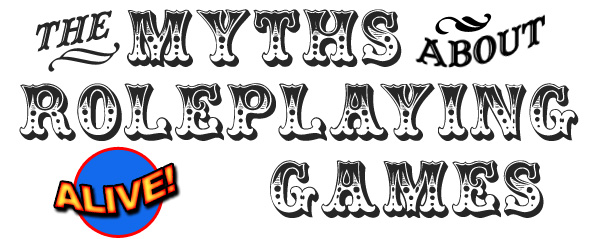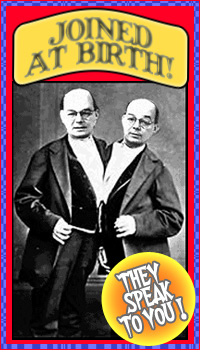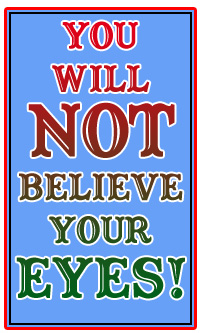
|

|
Main > FAQs > The Myths About Role-Playing Games
Over
the years, the role-playing hobby has amassed a menagerie of myths and
legends - both about how the game is played, and the type of people who
play them. What follows is a brief collection of the most popular myths
you may hear about role-playing games in general and Dungeons
& Dragons in particular. If you know of any that I
have missed, drop me a note to let me know -
In this respect, a player and their RPG character are no different than an actor or actress and the role that they play. Charleton Heston isn't really Moses. Vivien Leigh isn't really Scarlett O'Hara. Gene Wilder isn't really Willy Wonka. The things that those characters do in their respective stories are not the actions of the people who play them. It is terribly ironic when a news story accuses gamers of confusing fantasy with reality, while exhibiting much of the same confusion all on its own.
This myth also includes any claim that RPGs share some qualities that most of the games that preceded them do (they're played on a board, a player rolls dice to determine how far to move a piece, etc). Unlike other forms of games, RPGs do not usually have clearly defined winners and losers; rather, they are much more of an exercise in team effort. Confusion in this area is often proof that no real research into RPGs has been done.
RPGs often have a system of magic involved, and it is usually a form of fantastical magic, far-flung from anything found in witchcraft or the occult. There are some RPGs that have been designed to have a more "real-world" feel to them, and the authors have used actual occultic sources as their framework; nevertheless, one cannot learn how to cast spells by playing a role-playing game, any more than they can learn to swing a sword or ride a horse. The magic used in RPGs is entirely "make-believe," it exists only in the game world, and NEVER causes any effects in the real world. It is NEVER directed at real people, and any claims to the contrary are FALSE. While many RPGs have some form of magic system, many others do not, especially the plethora of science fiction RPGs.
It's strange that a devout sports fan who can talk about little more than scores and statistics isn't considered "obsessive" by most people, yet a gamer who plays once a week is. Any pastime holds the potential to do what it does all too well: pass time. A person who spends a lot of time playing RPGs is simply a person who would spend a lot of time doing something else if games were not a part of the equation. Personal responsibility and maturity are the true focus here. Gaming is no more of an obsessive hobby than any other, it just involves more brain power than most. Perhaps this is what a lot of the critics fear.
In many circumstances, games have been blamed for causing "seemingly normal" people to commit crimes that they would never have dreamed of had they not been exposed to RPGs. This is a preposterous notion to those of us who understand RPGs, but to many, it seems very possible in the light of all of the myths that are held as truth about games. The truth is, according to the CAR-PGa, that all media accounts of crimes committed "in the name of gaming" had many other, more understandable factors involved. The real story here is that "Abused Child Kills Parents" does not sell quite as many newspapers and magazines as "Game Taught Child To Kill."
Whether by causing severe depression over the loss of a character, or as some demented way to start their life over again at the beginning, RPGs have been accused of being a possible cause of suicide among their players. The Center for Disease Control, Department of Suicidology, and Albert Einstein University feel different about the matter, however; all three have done extensive research on RPGs and found no connection between gaming and suicide. The experts have spoken. Also, as mentioned above, the CAR-PGa has researched all of the "gaming related suicides" on the record, and found extenuating circumstances in every one. Again, it comes down to what sells more papers or keeps the public tuned in through the commercial break. It bears noting that the isolated incidents in which gamers have committed suicide are usually misinterpreted by the uninformed to make it appear as if gaming causes people to take their own lives. By their own figures, the suicide rate among people who play RPGs would be much lower than the average for any other group of people. Therefore, uninformed really isn't that harsh of a title.
While this may have been close to being accurate many years ago, it is certainly not true today. The fact is that many gamers are female, although the hobby is still male-dominated. In a study conducted by Wizards of the Coast in 1999, it was found that 19% of the respondents between the ages of 12 and 35 were female. That's almost one out of every five gamers.
Role-playing can be as simple as a game of cops-and-robbers in the backyard, or an intense session of playacting the bickering leaders of city-states on the brink of war. At it's root, it is the same type of game, but for most of us, the way we play is altered as our tastes mature. An 11-year-old can play a fighter in Dungeons & Dragons and go about hunting dragons and rescuing damsels and never tire of it. An adult who does the same will begin to look further into the character, developing a personal history, and pursue higher-minded goals. It's one of the great things about roleplaying; it spans not only age and maturity, but culture and gender, and becomes what the player wants it to be. It's hard to find a hobby that does that. In addition, in a study conducted by Wizards of the Coast in 1999, 59% of the gamers surveyed were between the ages of 19 and 35, and the largest portion of that range (34% of the whole) were between 25 and 35.
Keep in mind that any of the above myths apply equally as well to D&D, as it is the granddaddy of all RPGs. Likewise, some of these myths could have been applied to other RPGs that are similar to D&D in certain ways.
This myth has been propagated by William Schnoebelen, evangelist and self-proclaimed expert on satanism and witchcraft - but by no means was it started by him. Usually, this is an attempt to make D&D look like a tool for Satanists or occultists to gather new members. There is no evidence to support this claim. For more on Schnoebelen and his various claims, visit the Basic Gaming FAQ.
While not the most common myth, I have heard it more than once. And I have combed all editions and printings of the DM's Guide and Player's Handbook and found nothing of the sort. Can anyone help me out here? What could they be talking about?
This myth is only half right. While it is true that certain editions of D&D and AD&D contained several types of demons and devils in it's Monster Manual, they were listed as opponents, along with most of the other creatures in the Manual. When TSR released the second edition to D&D in the early 90's, they removed the demons and devils and replaced them with other creatures, in an attempt to keep everyone happy. In 2000, TSR announced that demons and devils would be returning to the game when the third edition of Dungeons & Dragons was released. In the November 1999 issue of InQuest Gamer, TSR brand manager Ryan Dancey referred to them as the "ultimate bad guys," and said in "all materials ever produced for the game, they are portrayed as opponents to be overcome, if not killed outright." Players do not worship any of the things found in a D&D manual; it's the characters that may (See the myth Player And Character Are The Same, above), and they are not given the option of worshipping either demons or devils.
This first came to me from a copy of the Jehovah Witness magazine The Watchtower back in 1983, and since then, I've heard it repeated several times. The truth is, there are no rules for arson, rape, or torture among the manuals for D&D, so therefore, these acts are not promoted by the game. However, it is possible for a character to perform these actions if the player wishes so. Therefore, technically, it can happen; however, anyone who actively chooses to do these things, and seems to be enjoying it, really needs to seek help. It is a sign of very serious problems. Some opponents of gaming have claimed that the Dungeons Master's Guide mentions rape in a manner that might encourage players to act it out. This is untrue. For more on this matter, check out the Basic Gaming Advocacy FAQ.
Again, this one is only half right. There are deities for the characters to serve in certain D&D books (Deities & Demigods, and the latter revision Legends And Lore, as well as others), but these are for the characters to serve, not the players. (See the myth Player And Character Are The Same, above). No one has to do anything special in the real world for a deity that their character serves in the game. That's just silly. Also: no character has to serve a deity. There are no specific rules designating that this must occur, except possibly in the case of cleric characters (holy men and women who gain their powers from a higher source). The original statement regarding this, made in the first edition Dungeon Master's Guide, suggested that all characters should serve a deity because it would help to flesh out the background and motivations of the character. This is just as if a Christian actor would research the Muslim faith if he were preparing for a role as a Muslim character. It is a vehicle for better role-playing, and not an adoption of a new faith system.
Actually, there was a book called The Arduin Grimoire that contained charts that were supposed to make medieval combat more "realistic." These charts contained bloody descriptions of body parts being torn off or crushed. But, it wasn't an official D&D product, and was not recognized by TSR as such, and due to it's violent nature, many stores refused to carry it.. The combat used in D&D and AD&D is much more "heroic" and unrealistic, because it is meant to recreate tales of heroic fantasy, not the first half hour of Saving Private Ryan.
This one has come to me in many forms - that he is mentioned as someone who embodies "D&D-style charisma," that he appears as a character in the manuals, or even that he would have made an excellent player. Actually, the first edition Dungeon Master's Guide does mention Adolf Hitler - but not as a hero, villain, or even as any part of the game. The mention is made in a discussion about the difference between charisma and physical beauty, and it uses him as an example of someone who had a very strong charisma with a certain group of people, but not much in the way of physical beauty. Any attempts to use this example as a connection between games and racism or anti-Semitism is very, very low. In doing so, one would also be suggesting that several history and sociology books are doing the same thing. To read more about this topic, including a direct quote from the Dungeon Master's Guide, visit the Basic Gaming Advocacy FAQ.
This is probably the first myth I had ever heard about D&D. This comes from the tale of James Dallas Egbert, who hid in the steam tunnels beneath his university and attempted (and failed) to commit suicide with a drug overdose. There is no evidence that he went down there to play D&D, as there was no one with him, and he didn't have any dice or books. Plus, he admitted his intentions to the media. Despite that, investigator William Dear, chose to maintain the gaming angle, partially in an attempt to protect both Dear and his family members from the truth about his homosexuality and drug abuse. In reality, most of us would rather sit around a table and enjoy the game, rather than get all hot and sweaty in an underground tunnel...
Contributors: Spencer Lease, Owen Raine This document is a work in progress, and is in no way complete as you see it here. If I have left something out, or missed an important point, it is imperative that you, the reader, bring it to my attention. All contributors will receive credit for their contributions at the end of the document. You can learn more about role-playing games by exploring the other FAQ files in this section:
|



 A player is a real
person; a character is the role that the player plays in the game. All
of the actions that the character makes, all of the items that they
possess, even the characters themselves are
imaginary, and do not exist in the real world. This is possibly the
most frequent mistake that people make about role-playing games.
A player is a real
person; a character is the role that the player plays in the game. All
of the actions that the character makes, all of the items that they
possess, even the characters themselves are
imaginary, and do not exist in the real world. This is possibly the
most frequent mistake that people make about role-playing games.  While combat does exist in most RPGs, it is
never promoted as the answer to everything. Conflict is a
large part of our history, and RPGs reflect that. But there
is much, much more to the hobby than simple hack and slash... if that
were not true, there would certainly not be as
many gaming books on the shelves as there are! There are
books on other cultures, people, races, and traditions, all of which
are interacted with in any number of ways, only one of which is
combat. If AD&D (for example) was the roleplaying
equivalent of Quake (for example), it would fit
rather neatly into one 100-page rulebook. For the record, it
doesn't.
While combat does exist in most RPGs, it is
never promoted as the answer to everything. Conflict is a
large part of our history, and RPGs reflect that. But there
is much, much more to the hobby than simple hack and slash... if that
were not true, there would certainly not be as
many gaming books on the shelves as there are! There are
books on other cultures, people, races, and traditions, all of which
are interacted with in any number of ways, only one of which is
combat. If AD&D (for example) was the roleplaying
equivalent of Quake (for example), it would fit
rather neatly into one 100-page rulebook. For the record, it
doesn't.